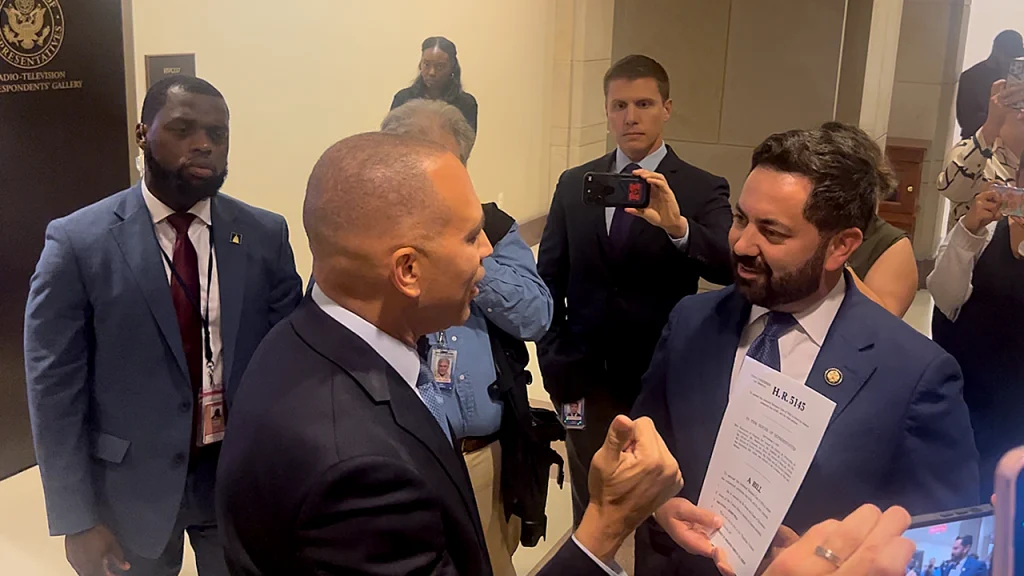Congressional Tensions Flare as Government Shutdown Drags On
In the midst of a government shutdown entering its third week, the hallowed halls of Congress have become a battleground for unprecedented verbal confrontations between lawmakers. What began as a policy dispute has evolved into personal attacks and heated exchanges that reveal the deep frustrations and high stakes surrounding this prolonged impasse. As of last Wednesday, the shutdown had been ongoing for eight days, significantly outpacing the mere two fights that occurred in the National Hockey League’s first seven games of the 2025-2026 season. The contrast is stark—professional hockey players known for their physicality showed more restraint than our elected officials entrusted with governing the nation.
One particularly explosive confrontation erupted between House Minority Leader Hakeem Jeffries, D-N.Y., and Rep. Mike Lawler, R-N.Y., outside the House Radio/TV Gallery Studio. The normally composed Jeffries was seen jabbing his finger toward Lawler’s chest, shouting, “You’re not going to talk to me and talk over me when you don’t want to hear what I’m going to say!” and demanding that Lawler “keep your mouth shut!” Meanwhile, Lawler fired back, “The only embarrassment here is you!” This public display of hostility between two representatives from the same state underscores how deeply personal the political divisions have become. Their argument delved into healthcare policy, with Lawler waving legislation about Obamacare subsidies and Jeffries responding with the pointed question, “Bro, do you understand math?” Such exchanges represent a troubling breakdown in professional decorum that would typically govern congressional interactions.
In another remarkable incident, Arizona Democratic Senators Mark Kelly and Ruben Gallego confronted House Speaker Mike Johnson, R-La., directly outside his office regarding the delay in swearing in Rep.-elect Adelita Grijalva, D-Ariz., who won her special election over two weeks ago. The tense exchange included accusations from Gallego that Johnson was “covering up for pedophiles” by preventing Grijalva’s installation, which would provide the crucial 218th signature needed to force a vote on releasing the Epstein files. “This is absurd,” Johnson responded with visible frustration, while Lawler, inserting himself into the confrontation, demanded they “knock it the hell off.” Johnson has denied that the delay in swearing in Grijalva is related to the Epstein files, claiming, “We’ll schedule it, I guess, as soon as she wants. It has nothing to do with it.” However, critics point to Johnson’s prompt swearing-in of Republican representatives Randy Fine and Jimmy Patronis just one day after their special election victories earlier this year, when Johnson publicly noted that adding these members made “the margin a little more comfortable” for House Republicans.
The human cost of this political theater is mounting daily. Thousands of federal workers have been furloughed or are working without pay, and the Biden administration has begun firing federal employees, a move that American Federation of Government Employees President Everett Kelley described as forcing “many families to pay the price for political gridlock that they didn’t cause.” Rep. Sarah Elfreth, D-Md., who represents 44,000 federal employees near Washington, DC, called the firings “unethical and immoral, but illegal,” noting that “Maryland has lost 15,000 federal jobs since President Trump took office in January.” The impact extends beyond federal workers to the millions of Americans who depend on government services now suspended or limited due to the funding lapse.
Speaker Johnson has expressed concern about the deteriorating civility within Congress, acknowledging, “This gets personal. Emotions are high. People are upset. I’m upset. I’m a very patient man. But I am very angry right now because this is dangerous stuff.” His admission that lawmakers might be better “physically separated right now” speaks volumes about the toxic atmosphere that has developed. The typically diplomatic interactions that characterize congressional business have given way to public accusations and confrontations more reminiscent of sports rivalries than professional governance. The unwritten rules that typically govern interactions between opposing sides—maintaining respectful disagreement, focusing on policy rather than personal attacks, and working together despite differences—appear to have been abandoned in favor of partisan point-scoring.
As House Democrats return to Capitol Hill this week specifically to highlight Johnson’s decision to keep the House out of session during the shutdown, tensions are likely to escalate further. The governmental equivalent of a hockey “line brawl” seems increasingly possible if all members return to Washington without a resolution in sight. For Rep.-elect Grijalva, the shutdown has prevented her from fully assuming her role: “I can’t hire staff. We don’t have an office. So it’s very much second-class citizen feeling for me.” Her situation exemplifies how the political standoff affects governance at multiple levels. As this shutdown enters its third week with no clear end in sight, the American public is witnessing their elected representatives “dropping their gloves” for political fights while the essential work of government remains undone. The contrast between professional athletes who maintain decorum despite their competitive nature and politicians who cannot maintain civil discourse presents a troubling image of our current political climate.













